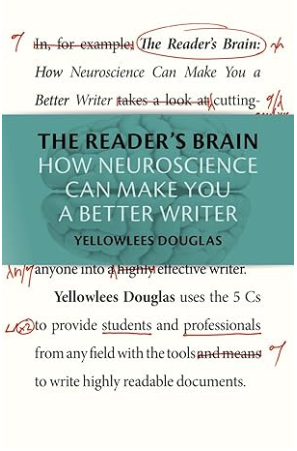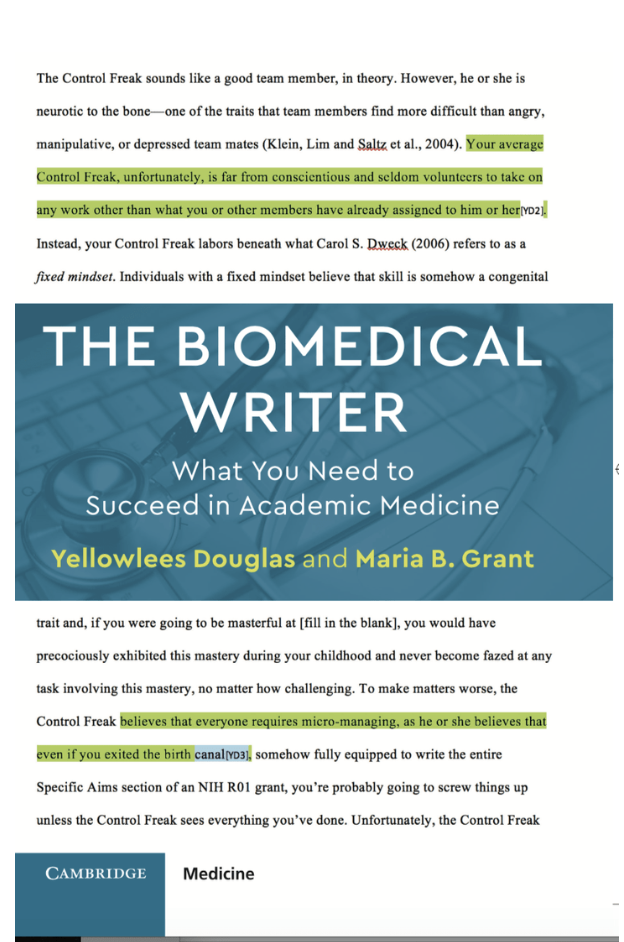Books and Publications
Check out my blog, How Writing Works, in
Books
“I Have Said Nothing,” Postmodern American Fiction: A Norton Anthology. Eds. Paula Geyh, Fred G. Lebron, and Andrew Levy. New York: W. W. Norton, 1997: 573-576.
The End of Books? Or Books Without End? Reading Interactive Narratives. University of Michigan Press, 2000.
The Reader’s Brain: How Neuroscience Can Make You a Better Writer. Cambridge University Press, 2015. Bestseller.
(with Maria B. Grant), The Biomedical Writer: What You Need to Succeed in Academic Medicine. Cambridge University Press, 2018.
Writing for the Reader’s Brain: A Science-based Guide. Cambridge University Press, 2024.
National Media
“Be Careful: What You Read Shapes How You Write,” Academic Minute, National Public Radio, 30 September 2016.
“Want to Write Better? Read Better Writing,” Boston Globe, 31 May 2016.
“Writing Courses Won’t Make You a Better Writer,” Daily Telegraph (UK), 6 July 2015.
“Unlocking the Black Box,” The Times Higher Education Magazine, 30 July 2015.
Selected Publications
“Dipping into Possible, Plausible Worlds: the Experience of Interactivity from Virtual Reality to Interactive Fiction,” TDR, The Drama Review: The Journal of Performance Studies 37.4 (T140) Winter 1993: 18-37.
“Making the Audience Real: Using Hypertext in the Writing Classroom,” Educators’ Tech Exchange 1.3 (Winter 1994): 17-23.
“Technology, Pedagogy, or Context? A Tale of Two Classrooms,” Computers & Composition: 11 (1994): 275-282.
“Virtual Intimacy and the Male Gaze Cubed: Interacting with Narratives on CD-ROM.” Leonardo 29.3 (1996): 207-213.
“The Three Paradoxes of Hypertext: How Theories of Textuality Shape Interface Design.” Readerly/Writerly Texts 3.2 (Spring/Summer 1996): 185-208.
“Abandoning the Either/Or for the And/And/And: Hypertext and the Art of Argumentative Writing,” Australian Journal of Language and Literacy 19.4 (1997): 305-316.
“Will the Most Reflexive Relativist Please Stand Up? Hypertext, Argument, and Relativism,” Page to Screen: Taking Literacy into the Electronic Age. Ed. Ilana Snyder. Sydney: Allen & Unwin and New York: Routledge, 1997: 144-162.
“The Three Paradoxes of Hypertext: How Theories of Textuality Shape Interface Design.” Ed. Stephanie B. Gibson and Ollie Oviedo. The Emerging CyberCulture: Literacy, Paradigm, and Paradox. Cresskill, NJ: Hampton Press, 2000.
(with Andrew Hargadon), “The Pleasures of Immersion and Engagement: Schemas, Scripts, and the Fifth Business.” Digital Creativity 12 (3), 2001: 153-166.
(with Andrew Hargadon), “When Innovations Meet Institutions: Edison and the Design of Electric Light.” Administrative Science Quarterly 46 (3), September 2001: 476-502.
“Here Even When You’re Not: Teaching in an Internet Degree Program.” Silicon Literacies. Ed. Ilana Snyder. New York: Routledge, 2002.
“Doing What Comes Generatively: Three Eras of Representation.” Theorizing the Matrix. Lewisburg, PA: Bucknell University Press, 2003: 58-76.
“What Interactive Narratives Do That Print Narratives Cannot,” Essentials of the Theory of Fiction. Eds. Michael J. Hoffman and Patrick D. Murphy. Durham, NC: Duke University Press, 2005: 443-471.
“Writing As A Survival Skill: How Neuroscience Can Improve Writing In Organizations,” American Journal of Business Education 5 (6), September/October 2012: 597-608.
“How Plain Language Fails to Improve Organizational Communication: A Neuro-cognitive Basis for Readability,” Journal of International Management Studies 7(2), October, 2012.
(with Samantha Miller), “Syntactic Complexity of Reading Content Directly Impacts Complexity of Mature Students’ Writing,” International Journal Business Administration 7 (3) (May 2016): 62-71.
“Top-Down Research, Generalists, and Google Scholar: Does Google Scholar Facilitate Breakthrough Research?” Open Access Library Journal 3 (May) 2016: 1-8.
(with Samantha Miller), “Syntactic and Lexical Complexity of Reading Correlates with Complexity of Writing in Adults,” International Journal Business Administration 7 (4) (June 2016): 1-10.
“The Power of Paradox: How Oppositional Schemas Enhance Recall in Organizational Communication,” International Journal Business Administration 8 (3) (May) 2017: 45-55.
Books
Yellowlees Douglas has actually checked all the boxes for teaching writing: twenty-one years as a tenured professor dedicated exclusively to teaching writing, a short story in the Norton Anthology of Post Modern American Fiction, and a doctorate in reading and writing in multi-media environments. She has also conducted extensive research on the reading brain and its implications for teaching writing in virtually every discipline—from anthropology to neurosurgery and management. In addition, she road-tested her easy-to-follow principles with publications in nearly two dozen disciplines, including sociology, organizational behavior, computer science engineering, ophthalmology, and genetics. Finally, as a copywriter, she has created campaigns for clients that include Cunard, Columbia Pictures, Abbott Laboratories, GlaxoSmithKline, ICL, and the Royal Society for Prevention of Cruelty to Animals.



